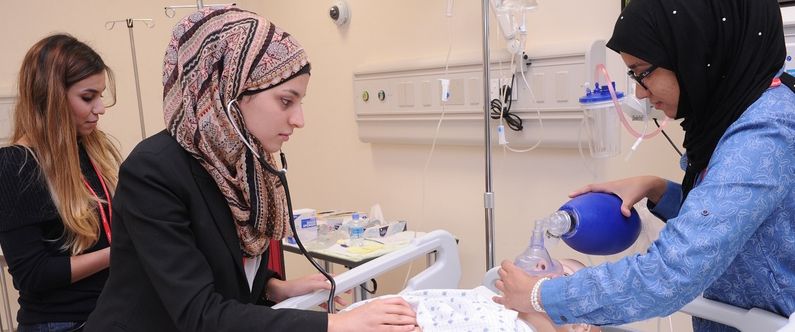International exchange students spend week at WCM-Q
 The international exchange students toured WCM-Q's facilities, including the state-of-the-art Clinical Skills and Simulation Lab.
The international exchange students toured WCM-Q's facilities, including the state-of-the-art Clinical Skills and Simulation Lab.
Ten students from medical colleges in Oman, India, Pakistan, Lebanon and Palestine spent a week at Weill Cornell Medicine-Qatar as part of the International Exchange Program.
The program brought two students and one faculty from each of the participating colleges to WCM-Q to explore the state-of-the-art facilities, learn about the curriculum and meet students and faculty. In January 2018 a return delegation of WCM-Q students will visit the College of Medicine and Health Studies at Sultan Qaboos University in Oman for a week on the Host Country Program.
The participating colleges were An-Najah National University of Nablus, Palestine; Dow International Medical College of Karachi, Pakistan; Kasturba Medical College of Mangalore, India; the American University of Beirut; and the College of Medicine and Health Studies at Sultan Qaboos University.
During the program, which is coordinated by the WCM-Q Division of Student Affairs, the visiting and host school students had the chance to compare the WCM-Q curriculum with other medical curricula, observe clinical encounters with students during clinical rotations, examine varying educational methods, including problem-based learning, and to learn about various aspects of country- and region-specific population health programs.
The students also visited WCM-Q’s Clinical Skills and Simulation Lab where they saw hi-tech learning aids such as electronic medical mannequins and an anatomage table – a human-sized touchscreen display for visualizing the human anatomy.

Student Yasmin Khader of Al-Najah National University in Nablus said: “I’m so impressed with the college, the facilities and the curriculum here. The anatomage table, for example, is really something amazing and we could see immediately what a useful teaching aid it is. It has been great to come here and see a different approach to teaching medicine.”
Khalil Al Ajmi of Sultan Qaboos University said: “The emphasis on problem-based learning and the hi-tech learning aids such as the electronic mannequin and the digital anatomage table are the things that most interested me. These are really useful and effective approaches to learning skills. I’m also really glad we all had this opportunity to take part in this worldwide interaction, which has been so interesting and thought-provoking.”
During the eight-day trip the students also toured Education City and healthcare institutions around Doha, including Hamad Medical Corporation, Al Gharaffa Medical Center, the Psychiatry Hospital and Rawdat Al Khail Wellness Center. Ms. Faten Shunnar, Director of Student Affairs, said “We are very happy with the outcome of the program, and we look forward to working and collaborating with other medical schools in the region.”
Dr. Ravinder Mamtani, senior associate dean for population health, capacity building and student affairs, said: “It has been a great pleasure to welcome students and faculty from Oman, Palestine, Pakistan, India and Lebanon to WCM-Q to exchange valuable knowledge about the many different approaches to teaching medicine that exist around the world. This program has provided us all with many valuable and rewarding experiences during a highly instructive week.”
